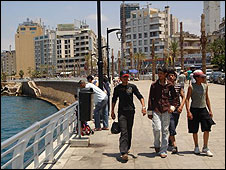 By Mike Sergeant, They call it the "miracle of Lebanon" - the ability of this country to bounce back after a devastating war or political crisis. Only last month, violence erupted on the streets of Beirut. Lebanon seemed to be bracing for another civil war. But within weeks of a peace deal being signed in Doha, a president has finally been elected and tourists are returning to the Lebanese capital. Once again, the evenings are filled with the sound of young people having fun and music blaring from Beirut's numerous bars and cafes. In some countries, it would take years for confidence and optimism to return after such a period of intense uncertainty. Not here. The Lebanese take huge pride in their ability to be crying one minute, and laughing the next.
By Mike Sergeant, They call it the "miracle of Lebanon" - the ability of this country to bounce back after a devastating war or political crisis. Only last month, violence erupted on the streets of Beirut. Lebanon seemed to be bracing for another civil war. But within weeks of a peace deal being signed in Doha, a president has finally been elected and tourists are returning to the Lebanese capital. Once again, the evenings are filled with the sound of young people having fun and music blaring from Beirut's numerous bars and cafes. In some countries, it would take years for confidence and optimism to return after such a period of intense uncertainty. Not here. The Lebanese take huge pride in their ability to be crying one minute, and laughing the next. "The mood is good," says one man in a bright pink T-Shirt. "There is peace and love here between people." A visitor from Kuwait tells me: "Nothing is miserable over here. It's a peaceful and beautiful place. It's coming back to life very quickly. In fact it's back already." The Corniche - Beirut's famous seaside promenade - has already returned to its former vibrancy. Fisherman perch on the rocks, young boys jump into the sea, men sit smoking their water pipes, little children toddle and run around, and youths on roller skates perform their stunts. "It's very nice. The atmosphere feels safer now," one woman tells me. "You enjoy going out because you feel relaxed. I am very optimistic about the future."
Most people here are trying not to get carried away, though. Lebanon has had too many disappointments in the past for that.
A peace deal may have been signed, a new president may have been elected, but the deep-rooted political problems in Lebanon remain.
Blockade lifted
After more than two weeks of intense negotiations, a government of national unity still hasn't been formed.
Lebanese have a unique ability to mix politics and hedonism |
That's why Tourism Minister Joseph Sarkis is cautious in his predictions. But for the first time in two years, he feels reasonably confident that the summer season will see a big increase in visitors.
"The atmosphere in the country has changed completely with regard to politics and security," he tells me.
For more than a year and a half nothing much was possible in the centre of Beirut. It was choked by blockades and the tents of opposition protestors. They've quickly vanished. The cafes and businesses are springing back to life.
The Place de l'Etoile restaurant is suddenly busy again. Manager Charles Asmar says takings have doubled and he's recruiting extra staff.
"Now is good. We can say it's very good in fact!" he says with a beaming smile.
Heads versus hearts
Open air concerts have been taking place in Martyrs Square. Over the past two years, many similar events have been cancelled.
The crowds hold aloft their Lebanese flags. With every cheer and wave they seem to affirm this country's vitality and resilience.
But everybody knows that Lebanon's underlying issues haven't been solved.
Political power is still carved up between the same parties and interest groups. Peace deals can certainly unravel very quickly. Lebanon may return to crisis just as fast as it recovers.
Louis Hobeika, an economist with Notre Dame University, says: "I am not really optimistic so far. To be optimistic I need to see a new government. I have to see the new government really moving ahead with concrete and good policies."
In their heads, most people share his reservations. But in their hearts they want to celebrate. The good vibe may not last. For now, people here seem determined to make the most of it.